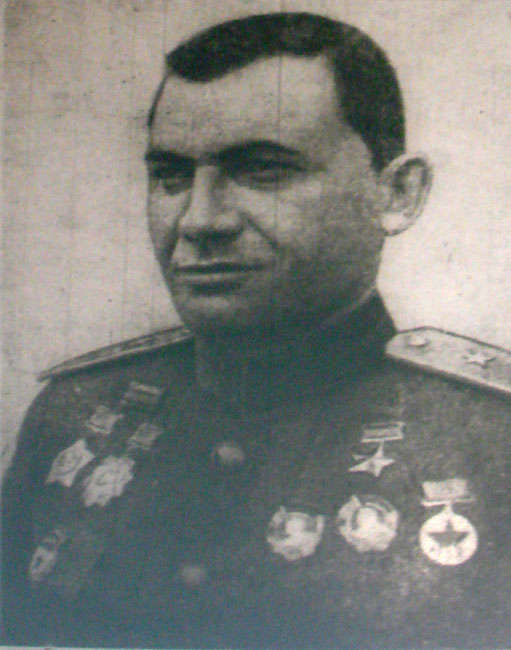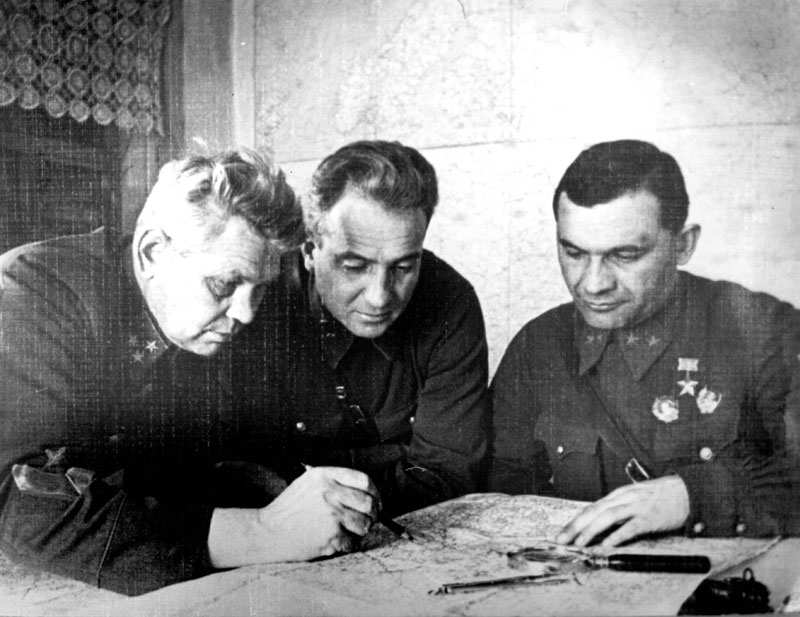Iakov Kreizer was born in 1905 in Voronezh. His father was a petty merchant. Iakov's grandfather, after 25 years of military service under the strict regulations of Nikolai I, earned the right for himself and his descendants to live outside the Pale of Settlement. Orphaned at age 15, Yakov was compelled to engage in heavy physical labor.
After volunteering for the Red Army in 1920 Iakov Kreizer graduated in 1923 from military school. That was the beginning of his highly successful career. In the spring of 1941, after completing a course at a military academy, he was already commanding the First Moscow Motorized Rifle Division, which implemented tactics determined by the Soviet General Staff.
After the June 22, 1941 invasion by Nazi Germany of the Soviet Union, during the very difficult first weeks of the war Kreizer's division succeeded for some time, by maintaining control of the strategic Minsk-Moscow highway, in halting the advance of the Wehrmacht. As Kreizer later noted, "… the division was able to hold up the enemy's troops heading for Smolensk, putting the brakes on its blitzkrieg…." For his conduct of this operation Kreizer was the first commander of a rifle division to receive the award of Hero of the Soviet Union (on July 22, 1941); two weeks later he was promoted the rank of major-general.
Starting in August 1941 Kreizer commanded armies on various fronts, taking part in the battles for Moscow and Stalingrad and in the liberation of the Donbass, the Crimea, and the Baltic regions. In February 1943 he received the rank of lieutenant-general and, then, later in July 1945 that of colonel-general.
In June 1942 Kreizer became a member of the presidium of the Jewish Anti-fascist Committee, in which he assumed an active role. Together with other members of the JAC's presidium he signed the greetings sent to the first Eretz Yisrael (All-Palestine) Congress of the "V" League that took place on August 25-26, 1942. That document stressed the longevity of the Jewish military tradition: "We send warm wishes to the congress of Palestinian Jewry that was established to organize aid for the heroic Red Army. Two thousand years ago in Palestine Judah Maccabee and Bar-Kochba rebelled against the ideological ancestors of Hitler and Mussolini…."
During the course of the war Kreizer was awarded many Soviet decorations, including those named after the 18th and 19th century Russian military leaders Alexander Suvorov and Mikhail Kutuzov that was given to officers and generals for successfully carrying out operations, as well as the order of Bogdan Chmielnicki.
After the war General Kreizer commanded several major Soviet military formations and from 1963 to1969 he was head of the Vystrel higher officers' course. In July 1962 Iakov Kreizer was awarded the rank of army general. He was the only Jew to be awarded this rank during the postwar period of state antisemitism.
Kreizer died in 1969. He was buried in Moscow's Novodevichy Cemetery, the Soviet pantheon where many famous people are interred.
Iakov Kreizer's Speech, 1942
From the Speech of Major-General Iakov Kreizer Given in Ufa at the Meeting Dedicated to the First Anniversary of Anti-Nazi Jewish Activity in the USSR, August 31, 1942:
"The Jewish People, like the other peoples of the Soviet Union, is strong of will and is determined to exterminate the fascist monster.
I am proud of my people, which has given the world many great personalities and brilliant thinkers. I am proud of my freedom-loving people which has time and again defended its independence against aggressor countries. The Romans, the ancestors of today's Italian fascists, have more than once felt blows from the Jewish people. Bar-Kokhba's name illuminated the way for many Jews. His name has gone down in history as a symbol of freedom and heroism.
I am proud of the hundreds and thousands of Jewish fighters in the Red Army who, together with the other Red Army men, have dealt and are dealing mortal blows to the enemy and are manifesting unprecedented examples of heroism in the [Great] Patriotic War…."
From: GARF 8114-1-156, p. 8, copy YVA JM/26140.
Article about Iakov Kreizer
Shmuel Persov wrote in 1942, in the article that in the author's unpublished version was called "The Jew Yankel Kreizer":
"In the headquarters archive that General Iakov Kreizer captured from the Fascists, along with many other trophies, was found the [German] appeal, which began with the following words:
'Russian soldiers, to whom are you entrusting your lives? Your commander is the Jew Iankel Kreizer. Do you really thinks that this Iankel will save you from our hands.'
When he read this appear of the Fascist madman, General Kreizer laughed and remarked: 'It's true, at home Mama and Papa often called me 'Yankel.''
Putting this fascist document in his pocket, to keep it as a momento, he added, 'Yankel — it's a good name. I am in no way ashamed of it.'"
From: Shmuel Persov, "Hero of the Soviet Union Iakov Kreizer," Eynikayt, July 7, 1942.








